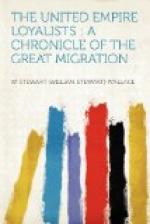Though the action of the mob never entirely disappeared, the persecution of the Tories was taken over, as soon as the Revolution got under way, by this semi-official organization. What usually happened was that the Continental or provincial Congress laid down the general policy to be followed, and the local committees carried it out in detail. Thus, when early in 1776 the Continental Congress recommended the disarming of the Tories, it was the local committees which carried the recommendation into effect. During this early period the conduct of the revolutionary authorities was remarkably moderate. They arrested the Tories, tried them, held them at bail for their good behaviour, quarantined them in their houses, exiled them to other districts, but only in extreme cases did they imprison them. There was, of course, a good deal of hardship entailed on the Tories; and occasionally the agents of the revolutionary committees acted without authority, as when Colonel Dayton, who was sent to arrest Sir John Johnson at his home in the Mohawk valley, sacked Johnson Hall and carried off Lady Johnson a prisoner, on finding that Sir John Johnson had escaped to Canada with many of his Highland retainers. But, as a rule, in this early period, the measures taken both by the revolutionary committees and by the army officers were easily defensible on the ground of military necessity.
But with the Declaration of Independence a new order of things was inaugurated. That measure revolutionized the political situation. With the severance of the Imperial tie, loyalism became tantamount to treason to the state; and Loyalists laid themselves open to all the penalties of treason. The Declaration of Independence was followed by the test laws. These laws compelled every one to abjure allegiance to the British crown, and swear allegiance to the state in which he resided. A record was kept of those who took the oath, and to them were given certificates without which no traveller was safe from arrest. Those who failed to take the oath became liable to imprisonment, confiscation of property, banishment, and even death.
Even among the Whigs there was a good deal of opposition to the test laws. Peter Van Schaak, a moderate Whig of New York state, so strongly disapproved of the test laws that he seceded from the revolutionary party. ‘Had you,’ he wrote, ’at the beginning of the war, permitted every one differing in sentiment from you, to take the other side, or at least to have removed out of the State, with their property ... it would have been a conduct magnanimous and just. But, now, after restraining those persons from removing; punishing them, if, in the attempt, they were apprehended; selling their estates if they escaped; compelling them to the duties of subjects under heavy penalties; deriving aid from them in the prosecution of the war ... now to compel them to take an oath is an act of severity.’




